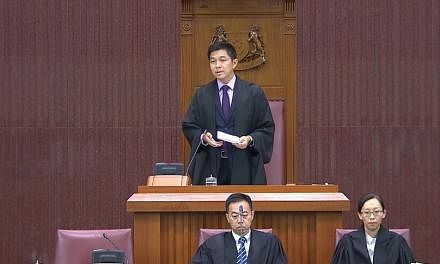Companies that receive government grants for their projects will be required to commit to outcomes that improve the lot of workers, such as raising wages, creating and redesigning jobs or hiring more older workers.
To spur the drive, two government programmes will be merged on April 1 next year: Inclusive Growth Programme (IGP) and Enterprise Development Grant (EDG).
The move to put workers first when businesses grow is a significant change in the Government's approach to enterprise transformation, said Dr Koh Poh Koon, Senior Minister of State for Trade and Industry, in yesterday's debate on his ministry's budget.
"Worker outcomes should no longer be an afterthought, but fully integrated into our enterprise grants from the first dollar given," he said in Mandarin.
"We have seen friction and instability arise in other parts of the world when workers feel they are left behind. We should learn from these developments and ensure our companies and workers share in the gains from transformation."
Dr Koh also said more is needed to encourage companies to share their productivity gains with their workers through higher salaries.
This is a requirement of the IGP, which is administered by the Employment and Employability Institute to help businesses kick-start productivity projects. The EDG, run by Enterprise Singapore, aims to help small and medium-sized enterprises take on more ambitious projects.
Earlier, Trade and Industry Minister Chan Chun Sing said the EDG will be extended for another three years to the end of the 2022 financial year, to help firms defray project cost of up to 70 per cent. The Productivity Solutions Grant was also extended until the end of the 2022 financial year, with enhanced support of up to 70 per cent for solutions and equipment that help smaller firms boost productivity.
-
Main measures
-
ENTERPRISE DEVELOPMENT GRANT
Extended for three more years till end-FY2022. NTUC's Inclusive Growth Programme will be merged into it on April 1 next year. SMEs can get grants of up to 70 per cent of project costs and non-SMEs, up to 50 per cent.
PRODUCTIVITY SOLUTIONS GRANT
Extended until end-FY2022. It supports 70 per cent of an employer's out-of-pocket training costs, up to $10,000 a company.
ENTERPRISE FINANCING SCHEME
To start in October this year, when eight existing schemes are to be merged. Insurance cover for overseas project financing is raised to a maximum of $50 million for at most 15 years. Firms going globalvia mergers and acquisitions to be covered for up to $50 million of loans.
GLOBAL READY TALENT PROGRAMME
To start in second quarter of this year for young Singaporeans to get overseas internships and work opportunities.
SCALE-UP SG PROGRAMME
Announced in Budget 2019 to help high-growth firms access networks and industry experts, with the Government paying 70 per cent of participation cost.
Dr Koh's announcement of the merger follows questions from MPs, including Mr Teo Ser Luck (Pasir Ris-Punggol GRC) and Mr Liang Eng Hwa (Holland-Bukit Timah GRC), about the Government's support for businesses and jobs through schemes and grants.
He said with all 23 industry transformation maps launched, the next phase will focus on deepening links among complementary industries.
This includes strengthening the partnership between Government and trade associations and chambers through the Local Enterprise and Association Development Programme, said Dr Koh.











